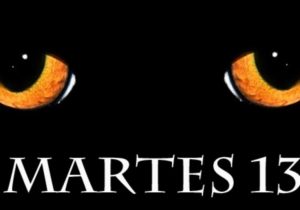 Como es considerado el día de la mala suerte por excelencia, según el refrán lo primero que serecomienda es no casarse ni asumir ningún compromiso. Los supersticiosos tampoco querrán hacer ningún viaje y puede que teman más de lo normal a los espejos, a cruzarse con un gato negro o pasar por debajo de una escalera.
Como es considerado el día de la mala suerte por excelencia, según el refrán lo primero que serecomienda es no casarse ni asumir ningún compromiso. Los supersticiosos tampoco querrán hacer ningún viaje y puede que teman más de lo normal a los espejos, a cruzarse con un gato negro o pasar por debajo de una escalera.
Esta superstición no sólo se da en España, sino que se comparte con la sociedad griega y algunos países de América Latina como Uruguay, Argentina, Chile, Perú, Venezuela o Colombia. Sin embargo, los países anglosajones, aunque también temen el mismo número que nuestro país, lo han trasladado al viernes 13, igual que en Italia.
Desde la antigüedad este día es conocido por los cristianos como “de mal augurio” debido a que eran 13 los asistentes a la Última cena de Jesucristo: doce apóstoles y el propio Jesús, considerando a Judas el número 13 por ser quien le traicionó.También eran 13 los espíritus malignos según la Kabbalah judía y fue en el capítulo 13 del Apocalipsis donde llegó el anticristo. Sin embargo, las leyendas se trasladan hasta los países escandinavos, que explican como Loki, el espíritu del mal, era el 13º invitado en una cena de dioses.
El Tarot no iba a ser menos y es que la carta número 13 corresponde a la muerte y a la desgracia eterna. Su nombre es El Arcano XIII y viene representada con un esqueleto que lleva una guadaña en la mano izquierda.¿Por qué un martes?
La razón viene determinada por la antigua astrología. La palabra ‘martes’ proviene del planeta Marte, que en la mitología romana estaba ligado al Dios de la Guerra y era conocido como el de la destrucción, la sangre y la violencia. A partir de la caída del Imperio Romano en Constantinopla en mayo de 1453, todo cobró mala suerte. Este hecho se asoció a un eclipse lunar que tuvo lugar un martes 13 y a las fuertes lluvias que impidieron la entrada de los navíos que iban a ayudar al Imperio Romano.
Gracias a esta serie de leyendas y sucesos históricos el martes 13 se ha convertido para muchos en un día de mal augurio.

Tuesday the 13th (do not get married, travel or leave your house)
It is considered the day of bad luck par excellence, according to the saying the first thing that is recommended is not to marry or assume any commitment. Those who are superstitious will not want to travel and may be more afraid of mirrors, crossing a black cat or going under a ladder.
This superstition not only occurs in Spain, but is shared with Greek society and some Latin American countries such as Uruguay, Argentina, Chile, Peru, Venezuela or Colombia. However, the Anglo-Saxon countries, although they also fear the same number as our country, have moved it to Friday the 13th, just as in Italy.
Since ancient times this day is known by Christians as “evil omen” because they were 13 attendees at the Last Supper of Jesus Christ: twelve apostles and Jesus himself, considering Judas the number 13 for being the one who betrayed him.
There were also 13 evil spirits according to the Jewish Kabbalah and it was in the 13th chapter of the Apocalypse when the antichrist arrived. However, the legends move to the Scandinavian countries, which explain how Loki, the spirit of evil, was the 13th guest at a dinner of the gods.
As for Tarot the 13th letter corresponds to death and eternal misfortune. His name is El Arcano XIII and he is represented with a skeleton that carries a scythe in his left hand.
Why Tuesday?
The reason comes from ancient astrology. The word ‘Tuesday’ derives from the planet Mars, which in Roman mythology was linked to the God of War and was known for causing destruction, blood and violence.
From the fall of the Roman Empire in Constantinople in May 1453, everything turned bad. This fact was associated with a lunar eclipse that took place on Tuesday the 13th together with the heavy rains that prevented the entry of the ships that were going to help the Roman Empire.
Thanks to this series of legends and historical events , Tuesday 13th has become for many a day of bad omen.